Cosmetic Crowns at Ararat Dental
Cosmetic crowns play a crucial role in rejuvenating worn-out, damaged, or decayed teeth. With a plethora of materials available, crowns offer diverse options tailored to individual needs, ranging from budget constraints to personal tastes and oral health aspirations. Although resilient, crowns aren’t impervious to wear and tear, necessitating eventual replacement. Consistent dental check-ups coupled with diligent oral care practices can prolong the longevity of your crown, ensuring a radiant smile for years ahead.
Frequently Asked Questions
A dental crown, resembling a tooth-shaped cap, serves to restore weak, broken, or decayed teeth. Made of various materials, a crown is placed atop the damaged tooth.
The Process:
Firstly, the damaged or decayed tooth undergoes reshaping to accommodate the crown. This involves the removal of a small amount of enamel to ensure a proper fit.
Next, the dental crown, customized to fit over the entire tooth snugly, is bonded securely in place by the dentist.
The following are the reasons why you would need Dental Crown?
✓ Cover a severely stained or discolored tooth.
✓ Hold a dental bridge in place.
✓ Protect and support a cracked tooth.
✓ Cover a dental implant.
✓ Restore a worn-down or broken tooth.
✓ Strengthen a weak tooth.
✓ Cover a root canal-treated tooth.
Your dental crown should not cause significant pain. While it’s common to experience sensitivity after getting a crown, any discomfort should not be severe enough to disrupt your sleep.
If you feel any pain during the procedure, let us know immediately. They can administer additional anesthesia to ensure your comfort throughout the process.
If a crown isn’t suitable for your needs, there are alternative treatments to consider:
Inlays and Onlays: These restorations are used when a tooth is too damaged for a filling but doesn’t require a full crown. They fit into the affected area like puzzle pieces.
Veneers: If your concerns are purely cosmetic and your tooth is otherwise healthy, veneers can address chips, cracks, and discoloration on the tooth’s front surface.
Tooth Extraction and Dental Implant: In cases of severe decay or damage where a crown may not be effective, extraction followed by a dental implant might be recommended for a more predictable outcome.
After undergoing a dental crown procedure, most individuals can typically return to their regular activities, including work and school, right away. However, it’s common to feel some sensitivity, particularly to hot and cold temperatures, for a few weeks.
Additionally, you might experience mild soreness or tenderness in the gums surrounding the treated tooth. These symptoms are normal and typically subside within a few days. Over-the-counter pain relievers such as acetaminophen or ibuprofen can help alleviate any discomfort you may experience.
Clarifying the Terminology: Dental Cap vs. Crown
The terms “dental cap” and “crown” are interchangeable—they both refer to the same dental restoration. Some individuals may use the term “cap” because it visually represents the covering nature of the restoration.
At Ararat Dental, the cosmetic crowns procedure typically entails two visits. Here’s a breakdown of the steps involved, organized for clarity:
What Would Happen During Your 1st Visit to Ararat Dental
Initial Preparation: Your dentist begins by preparing your tooth for the crown, which involves removing some natural enamel to create space and ensure a secure fit. Any necessary filling material is also applied to strengthen the tooth’s foundation.
Dental Impressions: Next, impressions of your teeth are taken, either physically with a putty-like substance or digitally with a handheld scanner. These impressions are sent to a dental lab to create your customized crown.
Temporary Crown Placement: While awaiting the final crown, a temporary one made of resin or acrylic is placed to protect the prepared tooth.

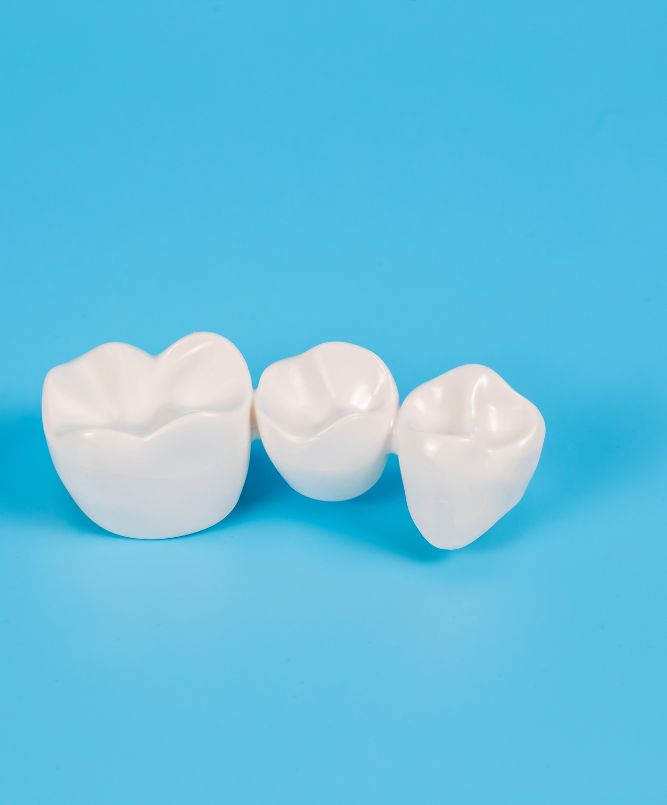
What Happens During the 2nd Meeting
Removal of Temporary Crown: Once the lab completes your crown, your dentist removes the temporary crown during your second visit.
Evaluation and Adjustment: Your dentist checks the shape, color, and fit of the new crown to ensure it matches your natural teeth and feels comfortable.
Final Bonding: Using a durable dental cement, the new crown is securely bonded to your tooth, completing the procedure.
How To Choose The Right Dental Crowns
Choosing the right dental crown involves considering various factors tailored to your preferences and oral health requirements. At Ararat Dental we create crowns from different materials, including resin, metal and porcelain.
Metal crowns, crafted from materials like gold, palladium, nickel, or chromium, offer exceptional durability and longevity. Despite their strength, their metallic appearance may not suit visible teeth, making them ideal for molars.
Porcelain-fused-to-metal (PFM) crowns combine durability with a natural look, matching the shade of your teeth. However, they may chip over time, and their metal core can wear down opposing teeth.
Pressed ceramic crowns feature a ceramic core, providing translucency similar to natural enamel. While durable, they can chip like PFM crowns.
All-ceramic or porcelain crowns boast the most natural appearance, suitable for those with metal allergies. Zirconia crowns, a popular choice, are exceptionally durable and gentle on opposing teeth.
For immediate results, same-day dental crowns, created using CAD/CAM technology, offer convenience in a single visit. However, they may not be suitable for everyone.
Alternatively, resin crowns provide a cost-effective option, though they’re more prone to breakage and typically used as temporary solutions.
Ultimately, consulting with Ararat Dental will help determine the most suitable crown type based on your individual needs and preferences.
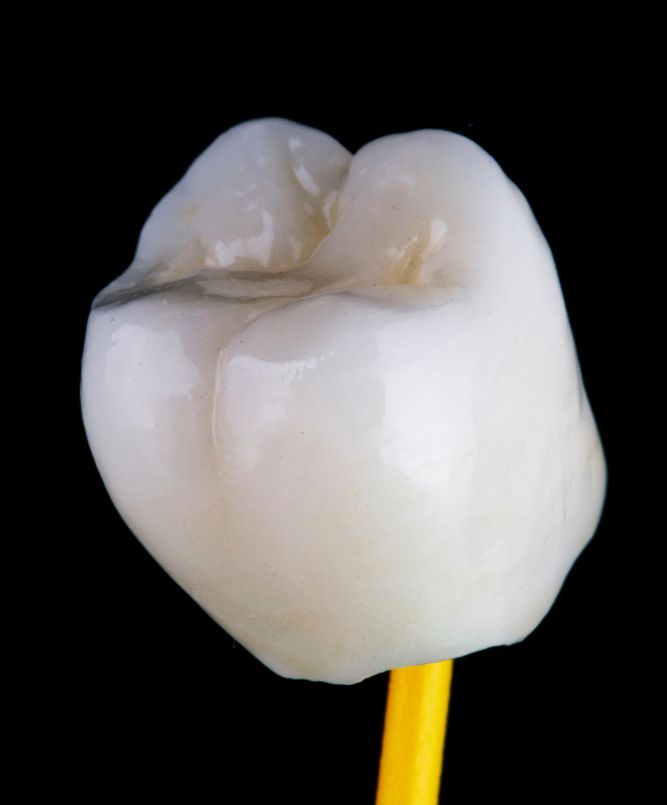

When do you need to call dental office, if you have a dental crown?
✓ Unpleasant breath odor or taste.
✓ Cracks or fractures in the crown.
✓ Looseness of the crown.
✓ Sharp edges causing discomfort to your tongue or gums.
Deciding Between Veneers and Crowns: Which is Best for You?
When choosing between veneers and crowns, it’s essential to understand their differences:
Veneers: These thin porcelain shells are primarily cosmetic and are ideal for addressing chips, cracks, and discoloration on the front surface of teeth.
Crowns: Unlike veneers, crowns cover the entire tooth and are both restorative and cosmetic. They aim to improve the tooth’s health while also enhancing its appearance.
Register for Free Consultation With Dr. Anahid Youssoufian
Check Out Our Amazing Transformations
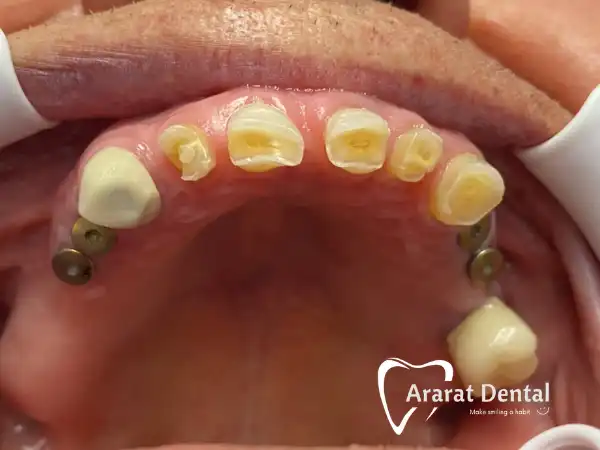
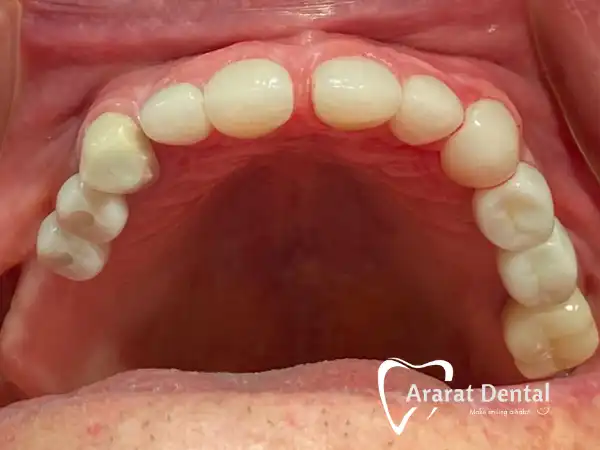
Cosmetic Porcelain Crowns & Implants
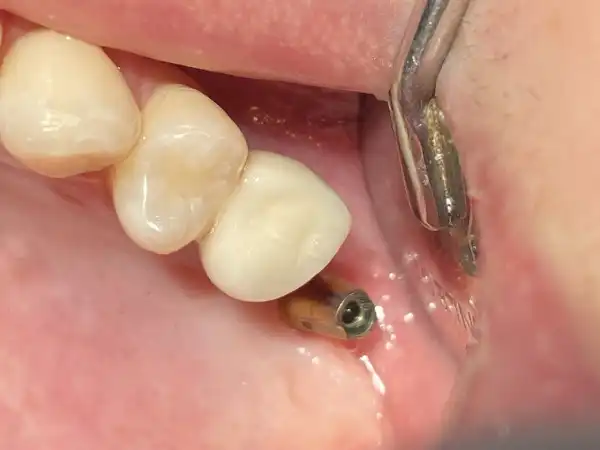
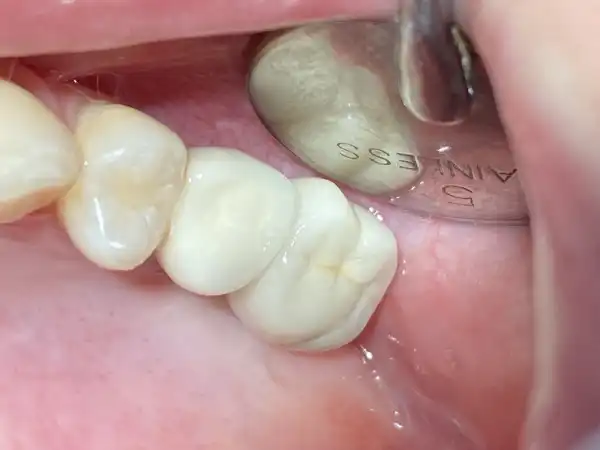
Placing Implant Crown
Searching for a cosmetology dentist near you? Ararat Dental specializes in cosmetic and aesthetic dental services.

